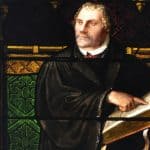
Whatever the theological malady, Martin Luther prescribed the same remedy: the word of God. For Luther, the Word was central to the Christian life. As a lover, translator, and interpreter of Scripture, Luther believed the Bible was too important to be left to academics. God’s word has always been and must always be for God’s people. What, then, can biblical studies learn from Luther? In Always Reforming, leading Lutheran, Reformed, and Baptist scholars explore Martin Luther as an interpreter of Scripture. In this interview, we speak with the editors of Always Reforming, Robert Plummer and Channing Crisler.
Lexham Press: Always Reforming is in honor of Mark Seifrid. Why a collection of essays on Luther?
Robert Plummer: Mark Seifrid is a man who loves the Bible and loves Martin Luther (in that order). So, a book about Luther’s approach to the Bible is a fitting tribute to Dr. Seifrid.
Channing Crisler: For those who know Mark Seifrid, both his ethos and his interests, it is fitting to focus on Luther in a volume meant to honor Dr. Seifrid. Even more, given current challenges in our culture and our churches, we need to hear from an interpreter like Luther who faced similar challenges and did so through the sacred text.
LP: What could biblical studies learn from Luther today?
Plummer: A great deal. Luther’s nuanced approach to allegory, for example, is especially relevant in our day when there is a movement to revive allegorical exegesis.
Crisler: The lessons are vast and robust. One lesson is that “doing theology” involves a constant interplay between study, prayer, and affliction (Anfechtung).
LP: What do you hope readers will gain from Always Reforming?
Crisler: I hope readers will recapture Luther’s vision for what the relationship between biblical scholars, theologians, and church can look like. We don’t have to go to our separate corners. Luther knew we needed each other.
Plummer: I hope that readers will come away with a renewed love for the Scriptures and a trustworthy roadmap through some current theological debates. That roadmap comes from Martin Luther’s reflections on the Bible.
LP: Do you have a favorite Luther quote?
Plummer: “If you feel and are inclined to think you have made it [as a theologian or preacher], flattering yourself with your own little books, teaching, or writing, because you have done it beautifully and preached excellently; if you are highly pleased when someone praises you in the presence of others; if you perhaps look for praise, and would sulk or quit what you are doing if you did not get it—if you are of that stripe, dear friend, then take yourself by the ears, and if you do this in the right way you will find a beautiful pair of big, long, shaggy donkey ears. Then do not spare any expense! Decorate them with golden bells, so that people will be able to hear you wherever you go, point their fingers at you, and say, ‘See! See! There goes that clever beast, who can write such exquisite books and preach so remarkably well.’” (from the Preface to the Wittenberg edition of Luther’s German writings)
Crisler: “Let them not mention me and call themselves simply Christian. What is Luther? What I will say, it is not mine. I am only a poor stinking maggot sack, incomprehensible that they call themselves to me. I am no one’s master and I do not want to be either. I have, just like everyone, the one, general doctrine of Christ, who alone is our Master.”







